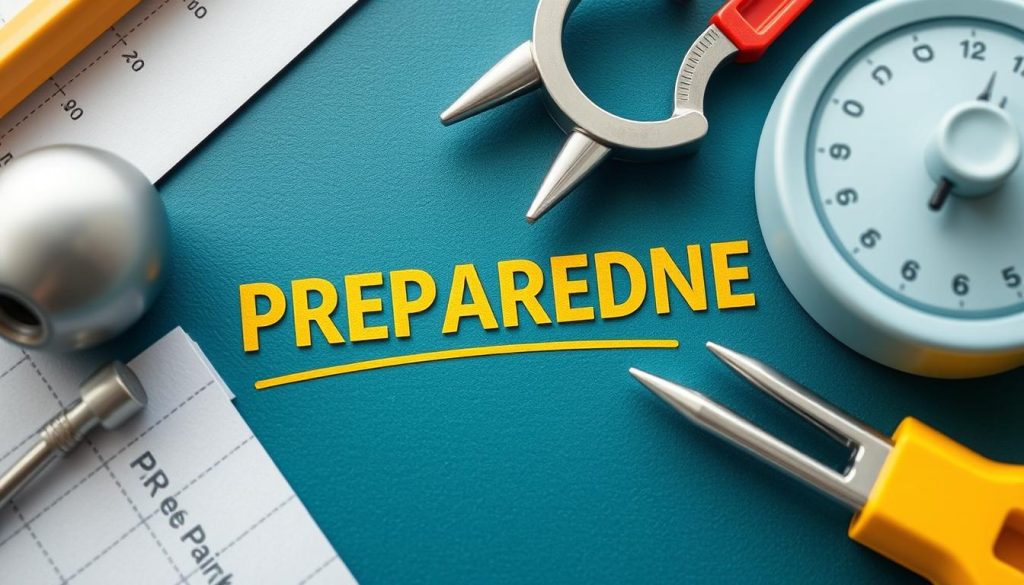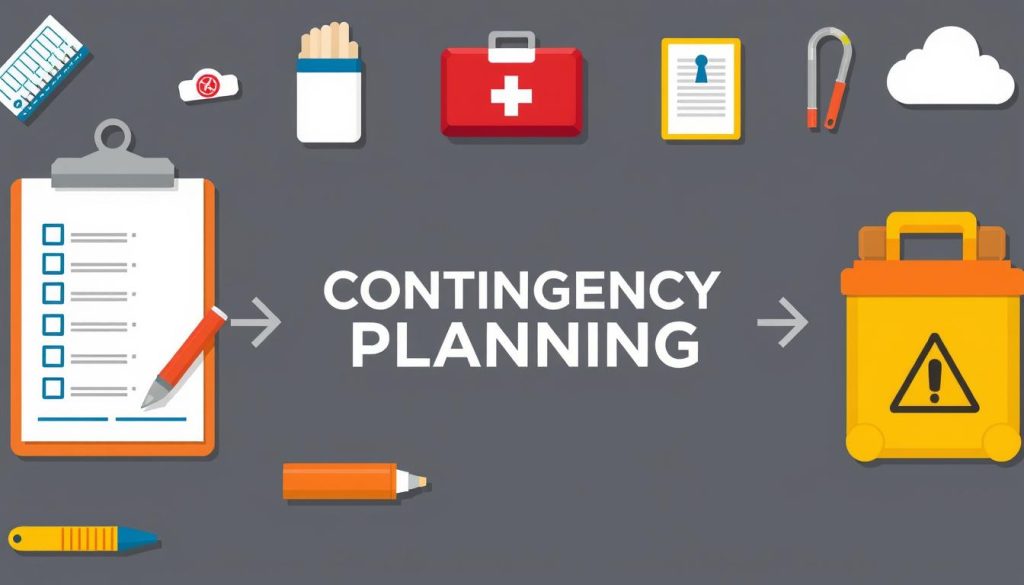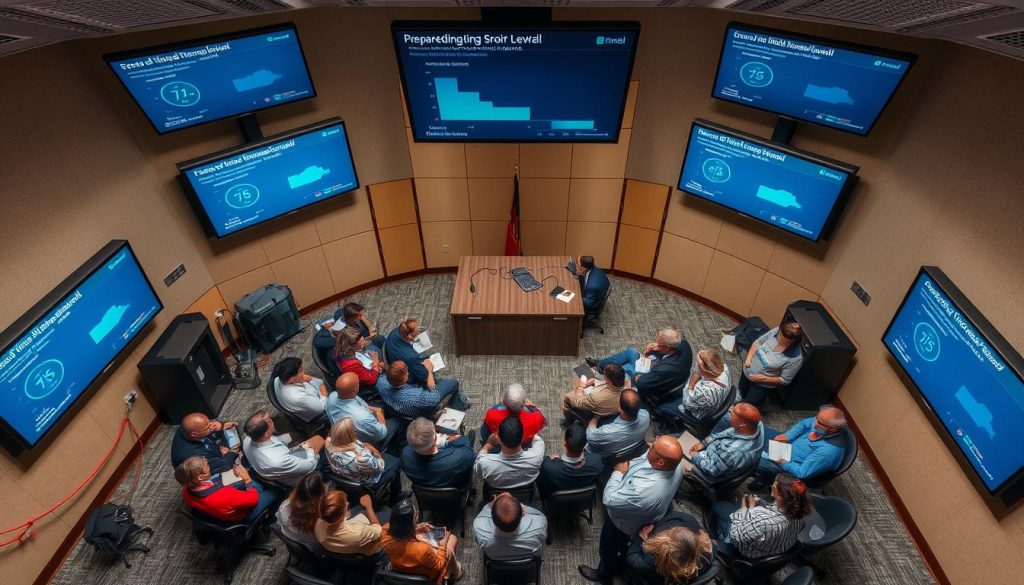In today’s fast-changing business world, checking how ready you are is crucial. This makes sure your organization can bounce back. In the United Kingdom, being ready for emergencies is key for all types of businesses. It starts with checking how prepared you are, which helps plan for tough situations.
Having a strong plan for being ready is important for UK organizations. This means they can handle sudden challenges well, protecting their work and the people involved.
Key Takeaways:
- Understand the importance of readiness assessment in business resilience.
- Learn the fundamental steps in preparedness planning.
- Acknowledge the significance of emergency readiness in diverse industries.
- Explore essential measures for effective UK organisational preparedness.
- Lay the groundwork for comprehensive readiness strategies.
Understanding the Importance of Readiness
In today’s fast-changing business world, being critically ready is key to business continuity. Companies that focus on strategic preparedness are much better at dealing with the unknown. They keep their operations smooth and lower the chance of interruptions. This kind of focus doesn’t just make a company stronger; it also improves their ability to manage risks well.
Many real-life examples show how important critical readiness is. Companies that are well-prepared can stay stable and quickly adjust when unexpected problems happen. They can move through tough times easier than those without a solid plan for preparedness.
Putting a strong emphasis on keeping the business going is crucial for lasting success. By making readiness a top priority, firms in the UK strengthen their day-to-day operations. They stay strong against possible dangers. Adding smart risk management strategies helps these companies not just survive, but flourish, even when times are tough.
To wrap it up, grasping and applying measures of critical readiness is vital for immediate and ongoing success in any organisation. Being strategically prepared is a must for any business that wants to stay ahead in today’s uncertain climate.
Identifying Potential Risks
It’s vital for any organisation to spot risks early to protect its business. We’ll look at threats from outside and problems inside. By checking for risks carefully, companies can avoid many problems. This is super important for UK businesses because risks can come from many unexpected places.
Evaluating External Threats
We must look at dangers that we can’t control, coming from outside. These threats include:
- Natural Disasters: Floods, earthquakes, and storms can stop our work.
- Economic Downturns: Money problems can change how much people buy and affect our supplies.
- Supply Chain Interruptions: If suppliers fail or goods don’t arrive on time, our business suffers.
Analyzing these threats well lets us prepare and protect our business. For example, using different suppliers can help us not rely on just one. Planning for money ups and downs also keeps us ready.
Analysing Internal Weaknesses
Looking inside our company for weak spots is just as crucial. These can include:
- Operational Inefficiencies: Making work smoother helps us waste less and do more.
- Employee Skill Gaps: Training our team keeps them ready for new challenges.
- Out-of-Date Technology: New tech keeps us ahead in the market.
Finding and fixing these issues makes us stronger. We need to check our company regularly to stay on top of things.
Creating a Response Plan
Contingency planning and crisis management are key for any organisation looking to limit disruptions in emergencies. Developing an effective response strategy helps businesses keep running and protect their assets.
Designing a Contingency Strategy
When setting up a contingency plan, it’s important to have clear crisis communication channels. This makes sure everyone knows their responsibilities and can respond quickly. Also, a detailed plan should include:
- Identifying possible risks and weak points.
- Setting up communication rules for everyone involved.
- Planning backup systems and how to manage resources for important tasks.
Assessing Resource Allocation
It’s crucial to make sure the right resources are ready and used well during a crisis. This part of planning involves checking if the team, materials, and tech are prepared. Main actions include:
- Managing inventory to distribute resources fast.
- Regularly reviewing and updating the resources plan.
- Training the team to improve their readiness.
A strong focus on planning and crisis management helps businesses stay strong and keep going, even during surprises.
Training and Development
Training and development are key for being ready for different emergency cases. By focusing on staff training, professional growth, and improving skills, organizations can greatly boost their ability to handle crises.
Implementing Training Programs
It’s important to set up effective training programs. These should cover many emergency situations. By using detailed emergency response training guides, employers can create specialized programs.
These programs must include:
- Theoretical knowledge of emergency protocols
- Practical simulation exercises
- Regular refresher courses
This way, training makes sure all team members can act quickly and effectively in a crisis.
Continuous Skills Improvement
Keeping skills sharp is essential. Investing in ongoing skills development helps staff keep up with new best practices and standards in the UK. A good development strategy needs regular assessments and ways to give feedback.
Assessing Your Readiness
Assessing readiness is key to making sure your organisation is prepared. Using detailed readiness assessment tools gives important insights. These tools highlight where you need to improve.
It’s also crucial to do thorough preparedness audits. These audits deeply check your preparedness actions and rules. They make sure every part of your plan is checked. Preparedness audits show what’s working and what’s not.
Having a solid readiness review plan helps too. A good plan organises how you check for readiness. It ensures you don’t miss anything. This leads to better operational readiness.
The aim is to make your organisation more capable of handling emergencies. By regularly checking and updating your strategies, you’ll be better prepared. This keeps your organisation strong.
- Regularly use readiness assessment tools to check how prepared you are.
- Carry out detailed preparedness audits to examine your current approaches.
- Put in place a firm readiness review structure for reliable checks.
- Always work to enhance operational readiness by filling in gaps.
Building a Communication Strategy
Effective crisis communication keeps trust and order during hard times. It requires a detailed strategy that covers talking both inside and outside the organisation. First, it’s crucial to make strong emergency communication plans. These plans must outline who will share important news and when. This keeps everyone informed quickly and correctly.
Talking to stakeholders is a key part of any communication plan. Keeping them updated and being open can stop false information. It also helps everyone work together. It’s important to use different ways to talk to each group effectively.
Internal communication is very important during a crisis. Employees need to understand what’s happening and the company’s goals. This reduces confusion and helps the company keep running smoothly. Good communication inside the company can also boost team spirit. It helps everyone respond together to any emergency.
- Define roles and responsibilities for communication during crises.
- Develop channels for regular updates and feedback.
- Use various communication tools to reach all stakeholders effectively.
- Ensure consistency in messaging across all internal and external channels.
In conclusion, having a complete communication strategy helps organisations face crises better. By focusing on strategic stakeholder engagement and precise emergency communication plans, companies can get through tough times more easily. It also keeps the trust of everyone involved.
Ensuring Compliance with Regulations
Following rules is key for businesses to face unexpected problems. Knowing UK laws helps firms make sure rules become part of their plans.
Understanding UK Compliance Requirements
UK laws are complex and need a deep understanding. It’s about working with groups like the Financial Conduct Authority (FCA) and the Information Commissioner’s Office (ICO). Keeping up with new rules is vital for staying compliant.
Creating a Compliance Checklist
Making a checklist helps companies check if they follow the rules. A good checklist should cover:
- Regular reviews of legal updates
- Documentation and records management
- Internal audits and assessments
- Staff training on compliance protocols
By carefully making and using a checklist, businesses improve their legal readiness in the UK. This ensures they consistently meet all needed rules well.
Utilising Technology for Better Preparedness
In our fast-changing world, using technology wisely can really boost how organisations handle emergencies. By adding new tools and software for readiness, processes become automated. This brings about better speed and accuracy in understanding data.
Innovative Tools and Software
UK organisations can change their approach to crisis management by using new tools. There are advanced software that offer things like forecasts, instant reports, and ways to communicate better. Take Everbridge and Tableau, for example. They have features that help make operations smoother, assisting in making quick, informed choices in emergencies.
Automation and Efficiency
Using modern tech tools brings many benefits, especially automation. It cuts down on manual work, reduces mistakes, and saves time. With robot processing (RPA) and AI, routine jobs can be handled by machines. This allows staff to concentrate on more important tasks. Such efficiency is vital for a fast and effective response when problems arise.
By adding technology into their planning, organisations can be more proactive in managing crises. They can handle difficult situations better, being more resilient and precise.
Monitoring and Evaluation
Keeping an eye on readiness and evaluating systematically are key to being prepared. Checking readiness often and giving precise feedback keeps standards high. It also helps make continuous improvements.
Regular Readiness Assessments
In the UK, it’s crucial for organisations to check their emergency plans often. This helps spot any issues or weak spots. These checks also mean plans can change as needed, meeting new challenges head-on.
Feedback and Improvement
Getting feedback from everyone involved in emergency responses is vital for getting better. This way, organisations can use feedback to keep plans up-to-date and effective. By always looking for ways to improve and rechecking readiness, businesses get stronger and more resilient.
Involving Stakeholders in Preparation Efforts
Getting everyone involved is key for full preparedness. This means bringing together team members from different areas. They work with outside groups to plan for emergencies. This teamwork is very important.
Engaging Key Team Members
It’s important to get all team members on board for success. With staff from all departments working together, the plan becomes stronger. Training and feedback keep everyone focused and motivated.
Collaborating with External Partners
Working with groups like the emergency services and local authorities is vital. These partnerships mean everyone is ready to act together during emergencies. Holding meetings and practice drills help make this teamwork effective.
Financial Preparedness Strategies
Financial stability is crucial for any preparedness plan. It ensures that organisations can keep going during surprise events.
Building financial resilience is key. It means planning carefully and having a strong plan for financial risks. This way, when unexpected costs hit, your strategy helps reduce the damage.
Having a budget for emergencies is also critical. Organisations need to set aside funds for surprises. This ensures they have cash ready when needed, keeping operations running smoothly despite financial challenges.
Understanding financial risk management is essential too. It’s about knowing the financial dangers and how to lessen their effects. Keeping financial risk plans updated helps organisations stay ready for economic troubles.
In conclusion, economic preparedness is more than saving money. It involves thoughtful planning and being ready to tackle financial risks actively. By focusing on these areas, organisations can maintain their success, no matter what happens.
Creating Redundancy Plans
Redundancy plans are key for keeping businesses running during surprises. Putting in place good strategies helps prevent the loss of important data and other issues. This part talks about key methods for keeping data safe and setting up backup sites.
Data Backup Solutions
Keeping data safe is very important for a business’s success. A strong data backup plan is a big part of redundancy plans. Here are some main strategies:
- Cloud Backups: Using cloud services means data can be reached anytime and anywhere, making things more secure.
- Incremental Backups: Doing regular smaller backups saves only the recent changes, which saves time and space.
- Offsite Backups: Keeping backups in a different location protects against disasters at the main site, improving data safety.
Alternative Operational Sites
Having backup business sites means a company can keep going smoothly in emergencies. Setting up these sites involves:
- Geographic Diversity: Picking sites in various places lowers the chance of one event stopping everything.
- Infrastructure Readiness: Making sure these sites are ready with the needed infrastructure is key for a quick move.
- Regular Testing: Testing these sites often makes sure they are always ready to use, helping to strengthen backup plans.
Developing Response Teams
It’s vital for every organisation to have strong emergency response teams. These teams handle crises. We’ll look into how to pick the right team and set clear roles for the best results.
Selecting the Right Team Members
Finding the right members is key. Teams need people with the right skills, experience, and cool heads under pressure. It’s also important to have people from different areas to tackle all crisis aspects.
- Skills and Experience: Pick people with the skills needed for crisis management.
- Diversity: Add members from different areas for more insights and skills.
- Pressure Handling: Choose those who remain calm and decide fast in stress.
Establishing Team Roles and Responsibilities
Defining everyone’s role is crucial. Each member must know their duties and how they help in a crisis. This ensures everyone works together well.
- Team Leader: Makes major decisions during a crisis.
- Communication Coordinator: Looks after all communication inside and outside.
- Logistics Manager: Makes sure resources and logistics are handled.
- Health and Safety Officer: Checks that safety rules are followed.
Choosing the right team and making roles clear are key to handling emergencies. This setup boosts your crisis team’s efficiency and readiness.
Maintaining Psychological Readiness
Psychological readiness is vital for overall readiness. It is often overlooked but really important. Keeping your mind stable and calm during crises helps a lot. It makes response strategies work better and more efficiently.
This part talks about how crucial mental health support is in crises. It looks at different ways to manage stress. This makes people more resilient. It ensures everyone is prepared and strong.
Providing Mental Health Support
Giving constant mental health support during crises is key. It helps build psychological readiness and toughness. Organisations should make sure they offer mental health help and counselling.
Starting Employee Assistance Programmes (EAPs) and mental health workshops is a good step. It helps staff deal with tough situations better. Letting people talk openly about mental health issues helps too. It makes them feel safe to ask for help, making the workplace better.
Stress Management Techniques
Managing stress well is crucial for staying mentally ready. Training in mindfulness and relaxation, like deep breathing and meditation, helps a lot. It lowers anxiety and stress.
Doing regular exercise and taking enough breaks during busy times also helps reduce stress. Offering resilience training programmes gives employees tools to stay calm and effective in emergencies.














